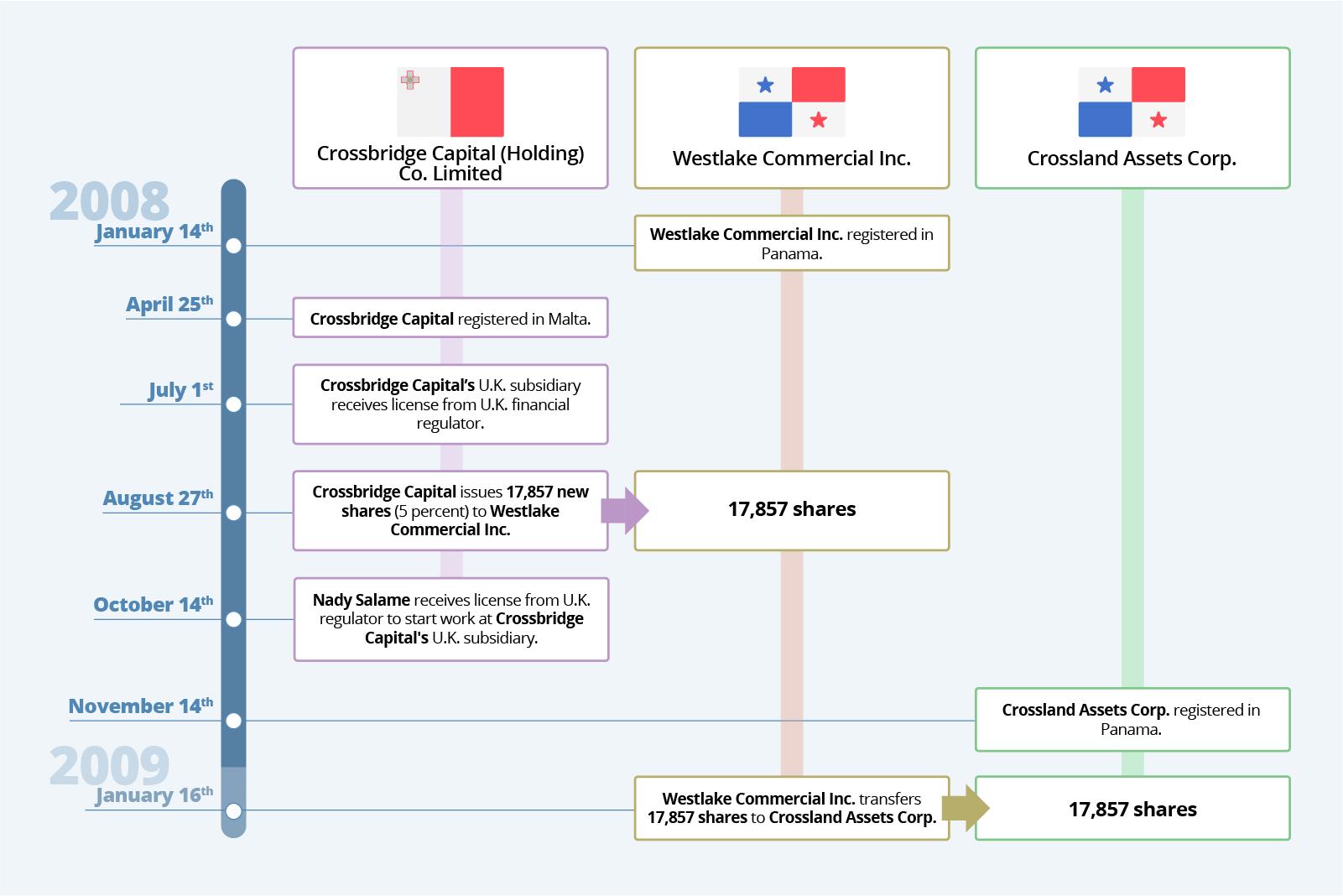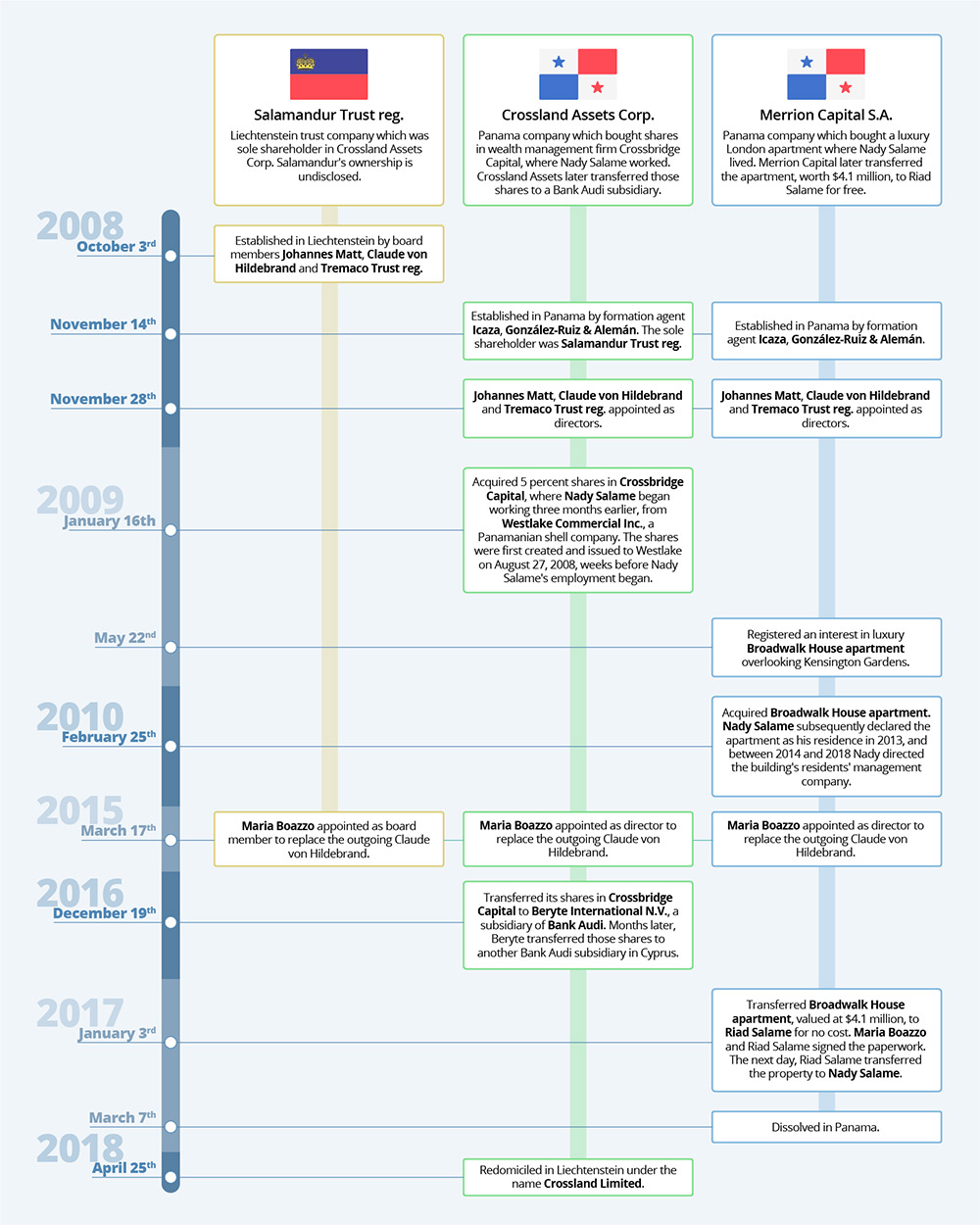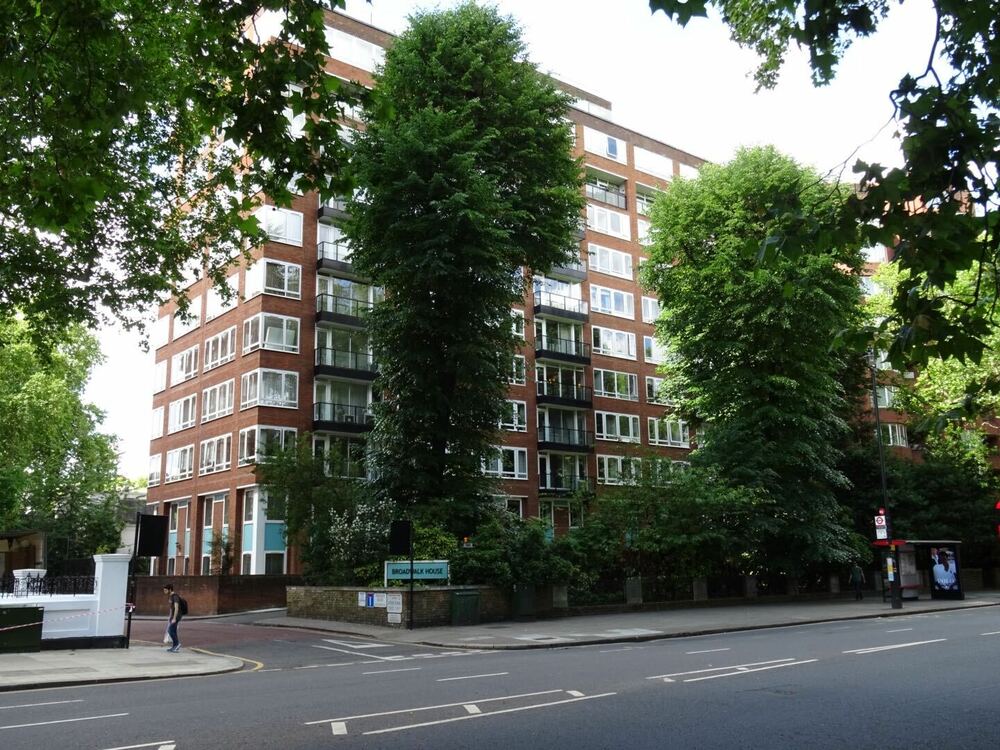A company tied to Lebanon’s central bank governor bought a stake in his son’s company, then sold it to a major Lebanese bank that he regulates, OCCRP and Daraj.com have learned.
These findings raise questions about whether the deal represented a conflict of interest for controversial Banque du Liban (BdL) Governor Riad Salame, whose extensive offshore real estate investments were the subject of an investigation published in August by OCCRP and Daraj.com, its partner in Lebanon.
The transaction involved shares in Crossbridge Capital, a London wealth management firm, that were held by an obscure Panama-registered company, Crossland Assets Corp. Salame’s son, Nady, formerly worked for Crossbridge and retains shares in his old firm.
Bank Audi, Lebanon’s largest bank, acquired the Crossland shares in 2016, as Riad Salame was instituting a controversial monetary policy that benefited the bank to the tune of $1.6 billion.
Who was behind Crossland Assets? It is impossible to say because its ownership is shielded by corporate secrecy laws. But there are clues tying it to Riad Salame.
Crossland was set up on the same day in 2008 and placed under the same management as another Panamanian company, Merrion Capital S.A., that gave Riad Salame a luxury apartment in London. The same group — two directors, two subscribers, an agent, and a treasurer — also managed Crossland’s sole shareholder, a Liechtenstein trust company.
Crossland was only two months old when it acquired the Crossbridge Capital shares, suggesting it was established for the purpose of buying them from another Panama shell company, Westlake Commercial Inc. Westlake’s ownership, and the terms of the transfer to Crossland Assets, are unknown.
Westlake, which has reported no other business activity, previously paid Crossbridge Capital $2.5 million for about 5 percent of the company.

Under Lebanese law, the Central Bank governor is prohibited from engaging in outside business beyond holding securities or shares in joint stock companies.
Ali Zbeeb, a Beirut-based lawyer and expert in international banking and financial regulation, told OCCRP that violating the prohibition would be considered a conflict of interest that could prompt removal from office.
No public records show a direct link between Riad Salame and Crossland Assets, nor is there direct evidence that he broke the law. However, OCCRP’s findings raise serious questions the powerful governor has refused to address.
OCCRP asked Salame three times over four months if he held an interest in Crossland Assets. Each time he deflected or ignored the question.
“We fail to understand this question,” he said through his attorney. He said OCCRP should contact Crossbridge Capital, which cited EU confidentiality directives in declining comment.
When asked again about Crossland Assets, Salame responded, “Any private matter is not open for discussion.” When asked about Westlake, Salame responded, “We have not identified any matter of public interest in your email… Consequently, we have nothing more to address in this communication.”

?Lebanon’s Offshore Governor
Riad Salame’s secret ownership of offshore companies with nearly $100 million in overseas investments was exposed by OCCRP and Daraj.com in August.
The investigation highlighted commercial properties held in the U.K., Belgium, and Germany. Several of the offshore companies were directed by his son, Nady, and the governor’s nephew.
Salame’s interest in the companies was concealed until 2019, when Luxembourg changed its previously opaque corporate registry to comply with EU standards for disclosure of beneficial owners.
In July, Salame was hit with a lawsuit in Lebanon that accused him of embezzlement of central bank assets and mismanagement of public funds, prompting a judge to freeze his assets. A hearing is scheduled in January 2021.
Salame has become a controversial figure in financially troubled Lebanon. When he visited the ESA Business School in Clemenceau on December 4, angry protestors barred the school’s entrance to trap him inside.
“It is not acceptable that the engineer of the thefts by the political establishment is giving a lecture inside a university,” lawyer Wassef Al-Harake said in a video captured by local media.
“You want to lecture, go lecture in your right place, in jail,” yelled another protestor. “You have no place among the people.”
Mount Lebanon Public Prosecutor Judge Ghada Aoun on Monday asked Salame to come to her office on Dec. 10 as part of an ongoing investigation into alleged exchange rate market manipulation, local media reported.
A legal source told OCCRP that Salame sent a written apology through a BdL lawyer, saying he could not come as demanded due to security concerns and asked her to set up a new appointment that would be kept from the media. The source said the judge accepted his request.
The Apartment
A key piece of evidence tying Riad Salame to Crossland Assets is a luxury apartment in London where his son, Nady, lived for years.
Before joining Crossbridge Capital in 2008, the younger Salame interned in the London operation of Credit Suisse, whose former directors founded Crossbridge Capital and made him one of their first hires.
In 2009 Merrion Capital filed papers to register an interest in a luxury apartment just across Hyde Park from Crossbridge Capital’s office in Mayfair. Merrion Capital bought the apartment outright in 2010. Nady Salame declared it his residence in corporate documents in 2013.

On January 3, 2017, Merrion Capital transferred the apartment, valued at $4.1 million, to Riad Salame, who signed a statement saying the transaction was “not for money or anything that has a monetary value.” The next day he gave the apartment to his son.
This series of events suggests Riad Salame received a large gift from an unknown party or that he owned or controlled Merrion Capital, which was dissolved two months later. He did not respond at all when OCCRP asked about this company.
Nady Salame, who still owns the apartment, did not respond to requests for comment for this article.
The Shell Game
Crossland Assets, the Panama company linked to Merrion Capital, moved to Liechtenstein in 2018. It reported $42.8 million in cash assets and $1.8 million in portfolio investments in December 2019.
Since its creation, Crossland Assets has been owned by a Liechtenstein trust, which is not required to file public information about its shareholders.
But the trust has a familiar name: Salamandur Trust reg.
Riad Salame did not respond when asked if he held an interest in Salamandur, or whether its name was derived from his own. But at least once in the past he appears to have been inspired by family names in creating legal entities.
?What’s in a Name?
In 2015, records made public through the “Swiss Leaks” exposed his beneficial ownership of an account at HSBC’s private banking arm in Geneva. The account was registered to a British Virgin Islands company, Naranore Limited, and had a balance of nearly $4.6 million in 2006-2007.
“Naranore” reflects a contraction of the names of Salame’s four children: Nady (‘Na’), Rana (‘Ra’), Nour (‘No’) and Reem (‘Re’). All four were identified as beneficiaries of the Naranore account, as was his wife, Nada, and Salame himself, as its settlor.
When asked about Naranore, Salame denied holding the HSBC account, saying he only held a personal account opened in his own name in the 1980s, prior to his central bank appointment.
But records show Naranore didn’t exist until 2003, when its HSBC account was opened. The leaked documents also identified Salame as a director at Merrill Lynch, though he hadn’t worked for the U.S. bank since 1993.
Salamandur was established in October 2008 with three board members: Johannes Matt, a former member of Liechtenstein’s parliament; Tremaco Trust reg., Matt’s professional trust services company; and Claude von Hildebrand.
A month later, the same three directors were appointed to run Crossland Assets and Merrion Capital.
Von Hildebrand resigned all three directorships in early 2015 and was replaced by Maria Boazzo, another trust professional based in Switzerland. All three trust professionals were associated with a tax evasion scheme that led to a record $2.6 billion fine in 2014 for Credit Suisse in the United States.
SOURCE : https://www.occrp.org/en/investigations/offshore-firm-tied-to-lebanon-central-bank-governor-sold-stock-to-bank-he-regulates

Recent Comments